UK:Assisted Dying Bill

MPs in the UK are grappling with a monumental decision regarding the assisted dying bill, which would grant terminally ill individuals in England and Wales the right to choose when they die. This bill has sparked intense debate, with hundreds of MPs pouring over evidence, emotions, and ethical dilemmas.
Four MPs, Dan Tomlinson, Jess Asato, Rebecca Paul, and Catherine Fookes, shared their thought process with the media. Tomlinson emphasized the weight of responsibility on MPs’ shoulders, acknowledging the difficulty of making a decision that aligns with their conscience, constituents, and the country.
“I definitely feel the responsibility on my shoulders to have thought this through,” Tomlinson said. “It’s far from clear how the vote will go, and I think anyone who is not daunted would be slightly worrying because they’re probably not realising the full gravity of it.”
Jess Asato, who has been holding public meetings with her constituents, expressed concerns about the bill’s safeguards. She worries that the measures in place may not be robust enough to prevent coercion or pressure on vulnerable individuals.
Asato’s concerns are rooted in her experience working as a domestic abuse campaigner before entering Parliament. She learned that many people never spot coercive controlling behavior, often not even the victims themselves.
“I’m trying to understand what has happened in other countries such as Canada and the Netherlands, which have legalised assisted dying,” Asato said. “I’m approaching this debate from a policy perspective, and I want to make sure that I’m making an informed decision.”
Rebecca Paul, Conservative MP for Reigate, also shared her reservations. She believes that predicting life expectancy is challenging, and the arbitrary six-month threshold may lead to legal challenges.
Paul consulted with her friend Dr. David Montgomery, a former Tory parliamentary candidate and medical researcher. Dr. Montgomery argued that it is difficult to accurately predict if someone has six months left to live.
“You can tell when people are very close to death,” Dr. Montgomery said. “But the prediction of six months as an arbitrary figure which is going to be open to huge interpretation and therefore I suspect quite a lot of legal challenge.”
Despite his concerns, Dr. Montgomery believes that the trend of Britons going to Switzerland to die proves the UK must debate assisted dying.
“I’m not sure this is the way to have it,” he said. “But I do think we need to have a debate about it.”
Catherine Fookes, Labour MP for Monmouthshire, has decided to support the bill. Her decision was influenced by watching her father suffer through a painful terminal illness.
“The last few days were incredibly difficult, he was in a lot of pain and it was really, really, really hard to see someone you really love going through that,” Fookes said. “He struggled to breathe and so seeing him like that made me realise that we needed a change of the law.”
Fookes admits it wasn’t an easy decision, but says her dad’s struggle informed her choice. She believes that the bill’s safeguards, including the requirement for two doctors to agree that a patient has six months or less to live, are sufficient to protect vulnerable individuals.
The assisted dying bill has split Parliament, with the outcome of the vote uncertain. MPs have been given a free vote, allowing them to follow their conscience rather than party orders. This decision has significant implications, and MPs are acutely aware of the responsibility that rests on their shoulders.
As the debate rages on, MPs are grappling with complex moral, ethical, and philosophical questions. They are considering the potential consequences of the bill, including the impact on vulnerable individuals, the role of doctors and healthcare professionals, and the potential for abuse or exploitation.
Ultimately, the decision to support or oppose the assisted dying bill is a deeply personal one. MPs must weigh their own values, beliefs, and experiences against the evidence and arguments presented. As they prepare to cast their votes, they are acutely aware of the significance of their decision and the potential impact it could have on the lives of thousands of people.






